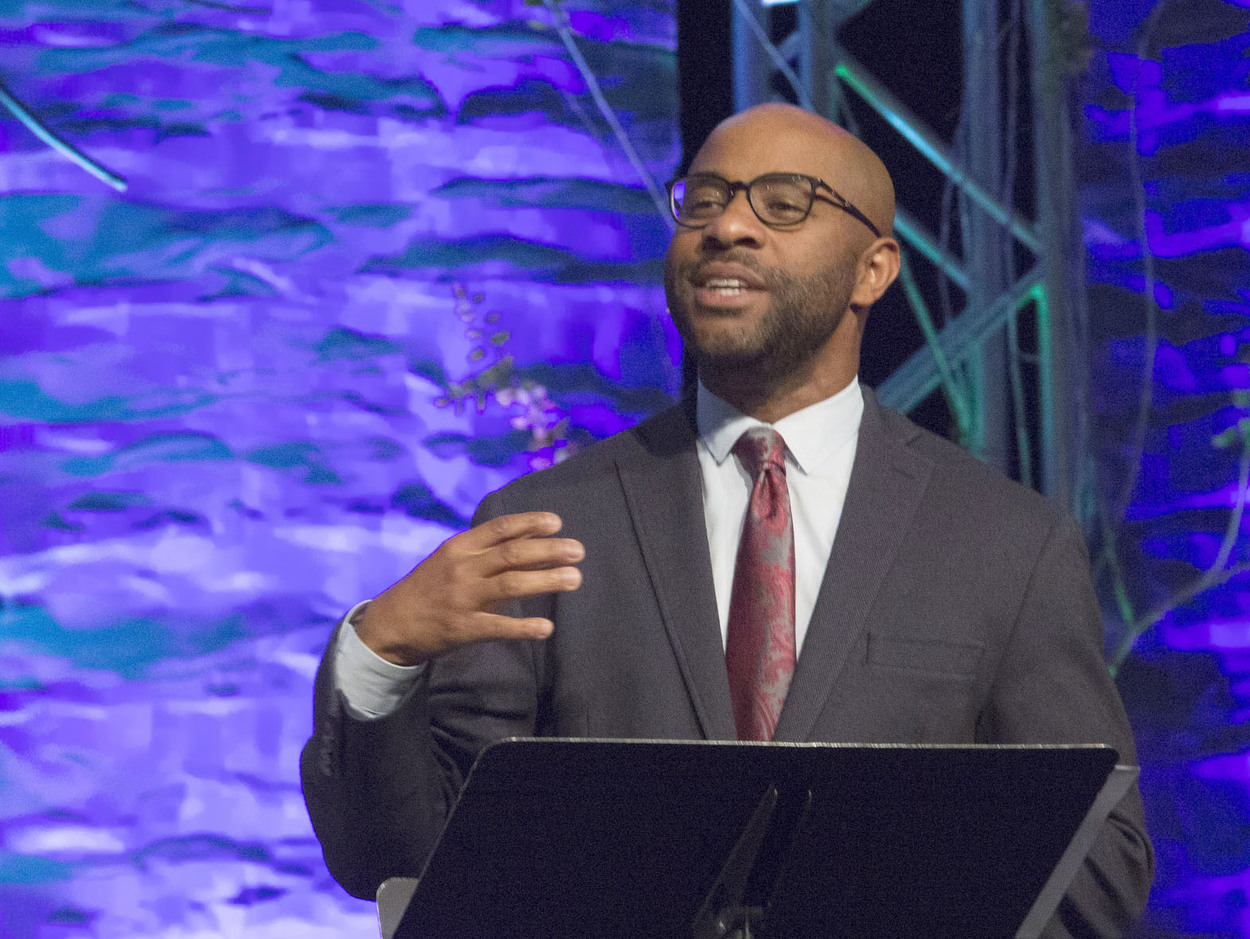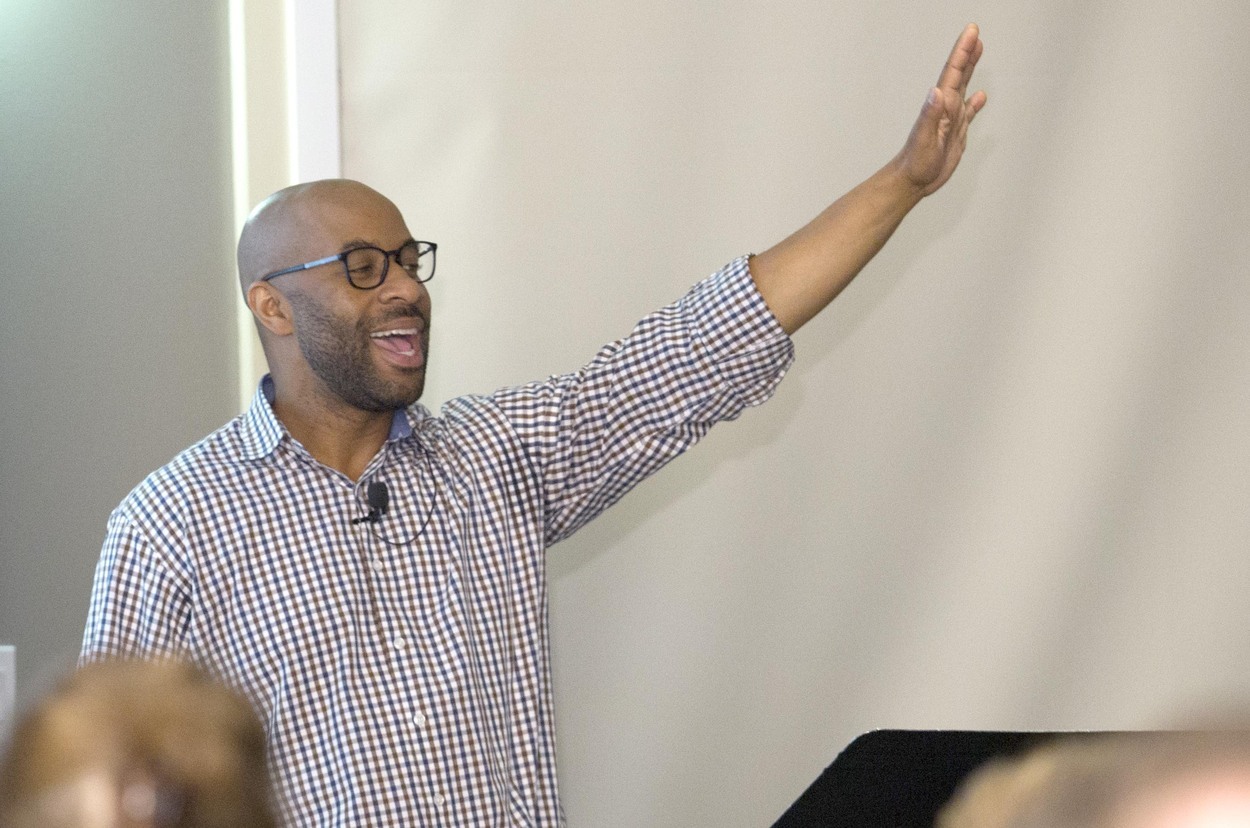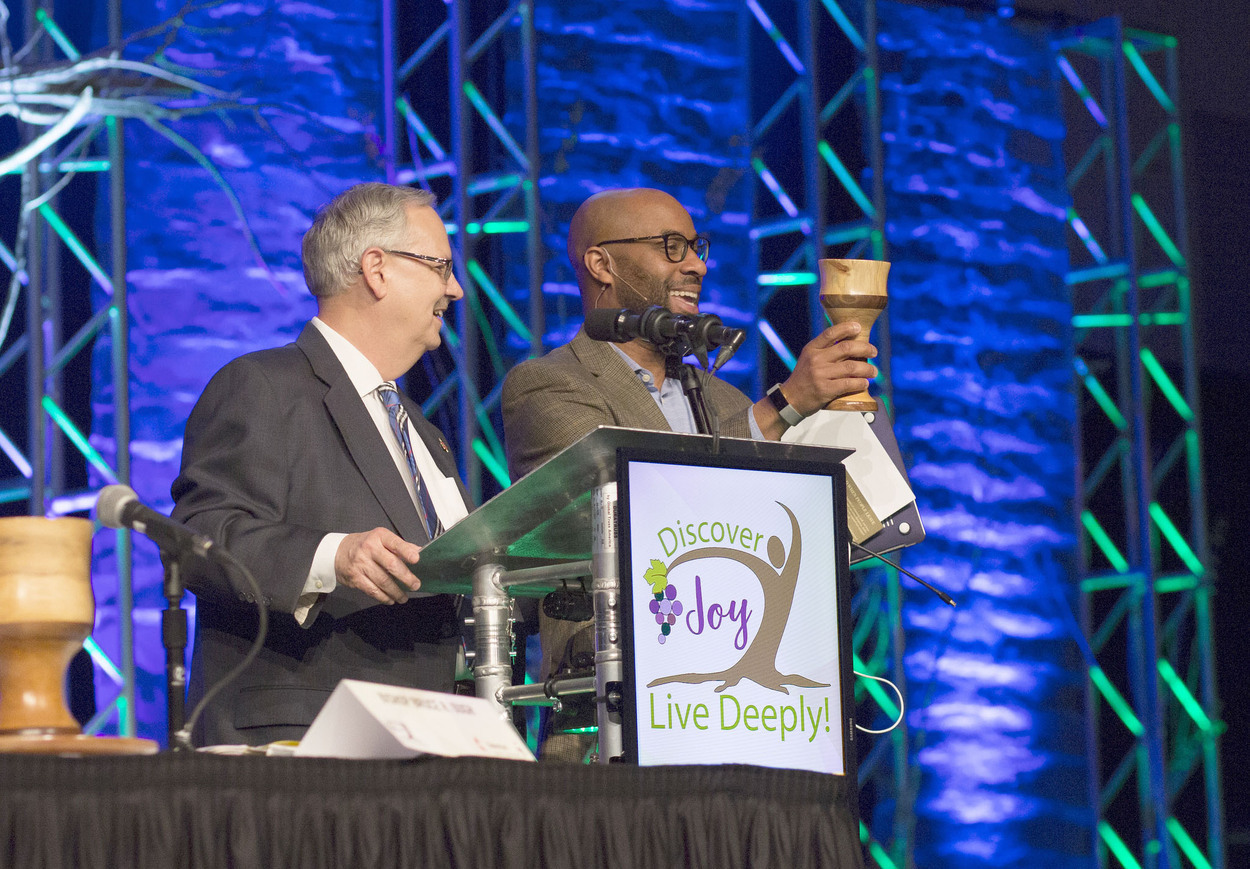
Olu Brown: Abide in Christ, do evangelism differently

“We are living in the greatest opportunity for evangelism in the history of the world…this is a time to be excited to reach new people for Jesus Christ,” Rev. Olu Brown told hundreds of people gathered at the Dakotas Annual Conference Session.
Brown—lead pastor at Impact Church in metropolitan Atlanta, the 56th-fastest growing church in America—delivered teaching sessions Thursday and Friday. In them, he implored those present to stay connected to the vine that is Jesus, to focus on evangelism, and to do discipleship differently.
Abide in Christ
Brown explored the importance of staying connected to the vine that is Jesus so we can be inspired to transform the world. Sometimes we get frustrated with the work of the church, he acknowledged, but he implored attendees not to quit and not to give up. When we aren’t connected to Christ, it is impossible for us to produce fruit.
“Your work is not in vain,” he told attendees. “The kid that you’re teaching at VBS is going to be the kid who grows up to be the doctor that discovers the cure to cancer…There’s a family on the verge of a breakdown who needs you. There’s a school that needs you. There’s someone wanting to take their life who needs to hear ‘Jesus died and rose again just for you.’”
Brown shared some of his own story of discovering that God had a call and a purpose for his life. As a 13-year-old, he asked his pastor if he could deliver an altar prayer. He wrote the prayer out word for word and was so nervous that he was literally shaking when he gave it. But through that experience, the pastor saw something in him and asked him to help out on Sunday mornings, which Brown then did.

Olu Brown also led pre-conference leadership workshops on Wednesday, June 6th.
“Then at 17 years old, I declared, ‘Lord, here I am! Send me!’” Brown said. “Now at 40, I’m still proclaiming the gospel of Jesus Christ.”
But staying connected to the vine involves pruning. Pointing to a tomato plant on stage next to him, Brown explained that in the tomato world, there are plant suckers—small branches that grow in the joint of two other branches. Gardeners understand that if that plant suckers aren’t pruned, they will take the life, water, and energy from the rest of the plant.
“Sometimes in our Christian experience, it is necessary for God to prune places in our lives,” he said. He urged attendees to make bold and sometimes difficult decisions that position them to bear fruit in their own lives and in the lives of their churches.
“Friends, we connect people to eternal life, and if that wasn’t a reason to change something in your church…I don’t know what else could be a reason to make you shift,” he said.
Evangelize and disciple differently
Brown urged attendees to be “catalyst evangelists”—those who go before to create an opportunity or atmosphere to connect people to Jesus. Twenty-first century evangelism says we don’t wait for people to come to us—we meet them on football fields, at ballet practices, in classrooms, on golf courses, and in many other places in our communities.
This means going outside of both your church and your comfort zone. There should be no one who knows your zip code better than you, Brown said.
He explained that the people in his congregation made a bold decision that they would get outside of their stained-glass windows and go to neighborhood parks, schools, and city buildings to pray over their mission field. “God has called us not to be evangelists on Sunday mornings only, not to be evangelists behind the walls but to go out into all the world teaching and preaching the good news of Jesus Christ,” he said.
At the same time, our churches must always provide extreme hospitality—which Brown defines as “all people are welcome, all people are worthy, and all people have a place.”
Of all places, Brown’s church provides hospitality in the men’s restrooms. There’s a small TV over each urinal that’s tuned in to ESPN every Sunday. “We think that men should love coming to church too,” he said.

After his second teaching session, Bishop Ough presented Olu Brown with a chalice made of wood from Storm Mountain Center. Rev. Brown, honored, said they will use it for communion this weekend at Impact Church in Atlanta.
Impact Church disciples people through the three E’s, Brown said: experience, engage, and evolve. Most people would call Sunday gatherings church services, but Impact leaders see them as worship experiences that last from the time someone drives onto the parking lot to the time they leave. That whole period offers an opportunity to engage them with the love of Jesus Christ. And part of engaging them means providing uncommon experiences, he said.
At Impact Church, on a football Sunday when many families would inevitably be watching the big game, worship design team members decided to plan a different kind of gathering. They brought in a drum line from a local middle school and had a football-themed worship experience. The kids in the drum line weren’t old enough to drive, so their parents had to bring them to the church to play—and Impact seized the opportunity to provide them with radical hospitality. Some were so moved that they continued to come back.
In a prayer at the end of his second teaching session, Brown concluded with: “We believe you have called us. Like Samuel with Eli in the middle of the night, we’ll always say ‘here I am, Lord...Send me. Send us. Send our church. Send our denomination because the world needs to know that there is hope in a risen Savior.’”